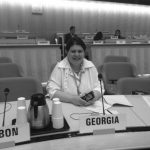Projects
Supportive Risk Awareness and Communication to Reduce the impact of Cross-Border Heatwaves
Location: EU, Georgia, Israel, Tunisia | Funded by: European Commission

Key objectives:
- Management and coordination of the action;
- Review of heat plans in Europe;
- Measuring heat-protective behaviour and awareness;
- Delineating a risk communication campaign for different target audiences;
- Promotion of cross-border collaboration.
Project description: SCORCH is an EU-funded project under the call by the UNION CIVIL PROTECTION MECHANISM of the Directorate General for European Civil Protection and Humanitarian Aid Operations. The overall objective of SCORCH is to reduce the health impact of heat waves on vulnerable, urban populations through improved risk communication strategies. These strategies will be informed by existing EU plans and guidelines, and by population surveys on the risk perception and behaviour of urban populations in EU neighbourhoods including Georgia, Israel and Tunisia.

Consortium
Partners: Evaplan Gmbh Am Universitatsklinikum Heidelberg, Germany | Université catholique de Louvain, Belgium | Sakvarelidze National Center For Disease Control And Public Health (NCDC), Georgia | International Network on Children’s Health, Environment and Safety, the Netherlands | Tel Aviv University, Israel
Evaplan
 Dr. Ahmad Zia Shams | Project Coordinator
Dr. Ahmad Zia Shams | Project Coordinator
Medical Doctor MD; PhD. MSc International Health (Heidelberg). Expertise in project development and management, consulting in public health and health systems strengthening, teaching; research fellow at German Cancer Research Center (DKFZ) focusing on prevention research.

Prof. Dr. med. Michael Marx
Professor of International Health at the University of Heidelberg; Director of Evaplan.
Medical Doctor MD; DTM&H (London); PhD. Specialist in Internal Medicine , Tropical Medicine & Public Health. Current research areas: Health Systems; Quality Improvement of Health Care/Patient Safety.

Dr. Valérie R. Louis
Data management and analysis, statistics and epidemiology, geographic information systems (GIS), laboratory skills in microbiology and molecular biology, field work, survey design.

Deborah Brenner, MA Translation Studies
Project management assistance & office administration
Dr. med. Svetla Loukanova
Senior Researcher and Technical Backstopper
Université catholique de Louvain, Belgium

Prof. Dr. Debarati Guha
Professor in epidemiology and director of CRED. Expertise in the epidemiology of natural disasters and civil conflicts.

Dr. Joris van Loenhout
Research fellow working on public health, epidemiology and natural disasters. Expertise on the health impacts of heatwaves, and on the heatwave perception and preparedness.

Dr. Kirsten Vanderplanken
Research fellow working on public health, epidemiology and natural disasters at CRED. Expertise in research on health care processes and collaborations between organizations.
L. Sakvarelidze National Center for Disease Control and Public Health (NCDC), Georgia

Dr. Nia Giuashvili
Adviser in environmental health, and Public Health expert of the Ministry of Labor, Health and Social Affairs of Georgia, Medical doctor, board certified in General Hygiene, Public Health and Healthcare Management, specialist in Public Health Regulations and Legislation, Quality Management, Patient Safety, Health Information Systems.
 Tamari Kashibadze
Tamari Kashibadze
Master of Public Health (MPH), concentration: Epidemiology and Biostatistics.
Public Health Specialist in Environmental Health field with the background of Prison Healthcare Policy Planning and Management.
International Network on Children’s Health, Environment and Safety, the Netherlands (INCHES)

Dr. Peter van den Hazel
Senior consultant specialised in environmental health. Medical doctor with advisory skill on science-policy transfer, environmental issues and incidents, children’s environmental health; training skills.
Tel Aviv University, Israel
Dr. Bruria Adini
Dr. Alexandra Chudnovsky
Steering committee
The Steering committee is the ultimate decision-making body of the consortium. The Steering committee consists of the Work Package Leaders (EVAPLAN, UCL and INCHES) and project management (EVAPLAN). Members of the Steering committee are Debarati Guha, Michael Marx, Peter van den Hazel, Joris van Loenhout and Ahmad Zia Shams.
What we do
Work planned & main achievements
SCORCH will review existing EU heat plans and guidelines and review analyses regarding their impact and effectiveness. Furthermore, we will conduct surveys on risk perception and behaviour in urban communities. Based on these insights and lessons learned, we will adapt the existing plans and recommend innovative risk communication strategies for EU neighbourhood countries, in particular for Israel, Georgia and Tunisia.
Expected products include a detailed report consolidating the strengths and weaknesses of existing heat plans (supported by key informant interviews), survey reports on community perception of heat, and detailed risk communication strategies based on the two prior achievements.
Results & impacts
The expected outcome will be an effective, evidence-based and targeted communication plan on heat-related health for application in EU Neighbourhood countries, adaptable to country-specific circumstances.
Expected impacts:
- reduction in morbidity, mortality and other adverse social effects of heat in the EU Neighbouring countries
- strengthened community adaptation to adverse consequences of heatwaves
- enhancement of cross-border and interservice cooperation for heat-related issues
Publications
Deliverables
Deliverable 4.1 Design for a Risk Communication Campaign: Communication Campaign
Deliverable 3.1 Results of Population Survey: Population Survey Results
Deliverable 2.4 Critical Analysis of Heat Plans and Interviews: Critical Analysis of Heat Plans and Interviews
Deliverable 2.3 Key Informant Interviews: Key Informant Interviews
Deliverable 2.2 Literature Review: Literature Review
Deliverable 2.1 Compilation of EU national Heat Plans: Heat Plan Compilation
Publications
Heatwave-protective knowledge and behaviour among urban populations: a multi-country study in Tunisia, Georgia and Israel (Joris Adriaan Frank van Loenhout, Kirsten Vanderplanken, Tamari Kashibadze, Nia Giuashvili, Amiran Gamkrelidze, Maya Siman-Tov, Bruria Adini and Debarati Guha-Sapir)
Heatwave preparedness in urban Georgia: A street survey in three cities (Joris Adriaan Frank van Loenhout, Kirsten Vanderplanken, Maria Moitinho de Almeida, Tamari Kashibadze, Nia Giuashvili, Amiran Gamkrelidze)
Governing heatwaves in Europe: comparing health policy and practices to better understand roles, responsibilities and collaboration (Kirsten Vanderplanken, Peter van den Hazel, Michael Marx, Ahmad Zia Shams, Debarati Guha‑Sapir and Joris Adriaan Frank van Loenhout)
https://www.ifrc.org/en/what-we-do/disaster-management/about-disasters/definition-of-hazard/extreme-temperatures/ (on heatwaves by IFRC)
https://72tuntia.fi/en/?lang=en (on self-preparedness)
Kick-Off Meeting Heidelberg
Presentations kick-off meeting
- Heatwaves and Health – Prof. M. Marx: Marx_Heatwaves and Health
- Country presentations
- Netherlands: vdHazel_Netherlands_Country Presentation
- Israel: Chudnovsky_Israel_Country Presentation
- Georgia: Nia_Georgia_Country Presentation
- Germany: Louis_Germany_Country Presentation
Background Literature
Astrom, D.O.; Forsberg, B.; Rocklov, J. Heat wave impact on morbidity and mortality in the elderly population: A review of recent studies. Maturitas
2011 , 69, 99– 105.
USEPA. 2013. United states environmental protection agency. Heat island effect. Available: http://www.epa.gov/hiri.
Van Loenhout, J.A.F.; Guha-Sapir, D. How resilient is the general population to heatwaves? A knowledge survey from the ENHANCE project in Brussels and
Amsterdam. BMC Res. Notes 2016, 9, 499
Cuesta, Julita Gil, et al. “General Population Knowledge about Extreme Heat: A Cross-Sectional Survey in Lisbon and Madrid.” International Journal of Environmental Research and Public Health, vol. 14, no. 2, 2017, p. 122., doi:10.3390/ijerph14020122
Climate change and extreme weather events: can developing countries adapt? M.Monirul Qader Mirza, Climate policy 2003.
Van loenhout JA, Rodriguez-llanes JM, Guha-sapir D. Stakeholders’ Perception on National Heatwave Plans and Their Local Implementation in Belgium and The Netherlands. Int J Environ Res Public Health. 2016;13(11)
Lowe, D.; Ebi, K.L.; Forsberg, B. Heatwave early warning systems and adaptation advice to reduce human health consequences of heatwaves. Int. J. Environ. Res. Public Health 2011 , 8, 4623–4648.
Mastrangelo, G.; Fedeli, U.; Visentin, C.; Milan, G.; Fadda, E.; Spolaore, P. Pattern and determinants of hospitalization during heat waves: An ecologic study. BMC Public Health 2007 , 7, 200
News
Here are records of events, activities and news related to SCORCH project implementation as well as those related to Health and Heat news items.
Articles in the media
Healthline – Here’s How Quickly Extreme Heat Can Affect Your Health
World Health Organization – Health advice: how to keep cool in the heat
CBC – What happens to your body when heat waves kill
Climate Centre – The Lancet: Extreme heat damaging health and livelihoods and threatening to overwhelm hospitals worldwide
Contact
For more information on SCORCH contact:
evaplan at the University Hospital, Heidelberg
Ringstr.19b | 69115 Heidelberg | Germany
Tel: +49(0)6221-138230
Fax: +49(0)6221-1382320
E-mail: team@evaplan.org
